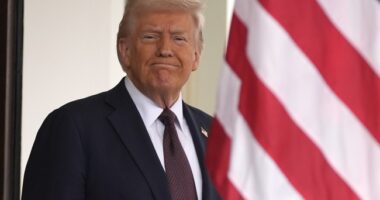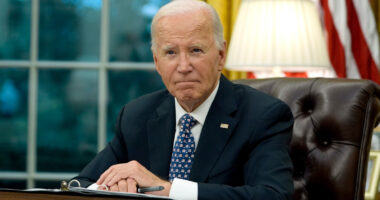The man who runs the world’s largest investment fund has decided to remain calm and wait for Trump’s tariff war to blow over.
Norges Bank Investment Management’s CEO, Nicolai Tangen, who oversees Norway’s massive $1.8 trillion sovereign wealth fund, expressed his view that the impact of rising tariffs cannot be prevented.
Tangen, aged 58, stated to The Wall Street Journal that hedging against this situation is quite challenging. Instead, he emphasized the fund’s reliance on long-term strategies and diversification to navigate such challenges effectively.
Approximately 50% of the fund is allocated to US stocks and bonds. Tangen is concerned that the new tariffs imposed by Donald Trump could potentially lead to a value decrease of over 33% for the fund.
‘You have a warm war and you have a cold war and you have a tech war and you have a trade war, you have a lot of fragmentation,’ the former hedge-fund manager told the outlet.
‘It’s negative because it impacts economic growth and potentially inflation. So there’s potential for this being very negative.’
Despite his expansive expertise, Tangen said his hands are tied and reiterated nothing can be done to soften the economic blow of his anticipated $600 billion loss.
He has opted to keep his stocks exactly where they are – keeping a cool composure -instead of trying to fight against what he believes is the inevitable.

Nicolai Tangen (pictured), the chief executive of Norges Bank Investment Management – Norway’s whopping $1.8 trillion sovereign-wealth fund – believes there is no way to stop the storm that increased tariffs have caused

About half of Tangen’s fund is invested in US stocks and bonds, and with the Donald Trump’s (pictured) new tariffs, Tangen believes it could lose more than a third of its value
As Tangen braces for an economic catastrophe, Trump has boasted about the exact opposite as the stock market has stabilized since the steep losses incurred after Trump’s ‘liberation day’ Rose Garden speech.
Employers also added more than 177,000 US jobs in April, blowing past analyst predictions of 135,000.
Trump wasted no time taking credit, saying his policies were ‘just getting started’ in a Truth Social post.
‘This is the second month in a row where the jobs report has beat expectations,’ Karoline Leavitt, the White House press secretary, said.
‘Wages are continuing to rise and labor force participation is increasing. This is exactly what we want to see. More Americans working for higher wages. More winning is on the way.’
The unemployment rate held steady at 4.2 percent, easing fears that tariffs and sweeping federal job cuts had already begun to erode the workforce.
It’s the second month in a row that job growth has outpaced predictions: payrolls initially increased by 228,000 in March (it was eventually revised down to 185,000).
US stock index futures extended gains after the stronger-than-expected jobs report calmed worries over the health of the labor market amid tensions of a global trade war.
As of Friday, futures for the Dow Jones were up 564.47 points, or 1.4 percent, for the S&P 500 were up 82.53 points, or 1.5 percent, and for the Nasdaq were up rose 266.99 points, or 1.5 percent.

Trump’s Liberation Day announcement (pictured) wiped trillions off the stock market, giving President Trump the worst first 100-day Wall Street performance since the 1970s

Before the strong jobs report, the stock market had been on a largely downward rollercoaster after Trump launched hefty tariffs on imported goods (pictured: stock image of Wall Street traders)
‘There are fears that falling consumer confidence and the volatile trade policies from the Administration could ultimately weigh on retail sales and the labor market,’ Bret Kenwell, the US investment and options analyst at eToro told DailyMail.com.
‘Although consumers have been shifting how they spend their money, they’re still spending, and that can keep powering the US economy forward.’
Before the strong jobs report, the stock market had been on a largely downward rollercoaster after Trump launched hefty tariffs on imported goods.
The policy announcement wiped trillions off the stock market, giving President Trump the worst first 100-day Wall Street performance since the 1970s.
April’s report and the subsequent stock rise gave the President a single-day reprieve from the fluttering market news.
April’s jobs numbers also extended a historic streak, according to the US Bureau of Labor Statistics.

















